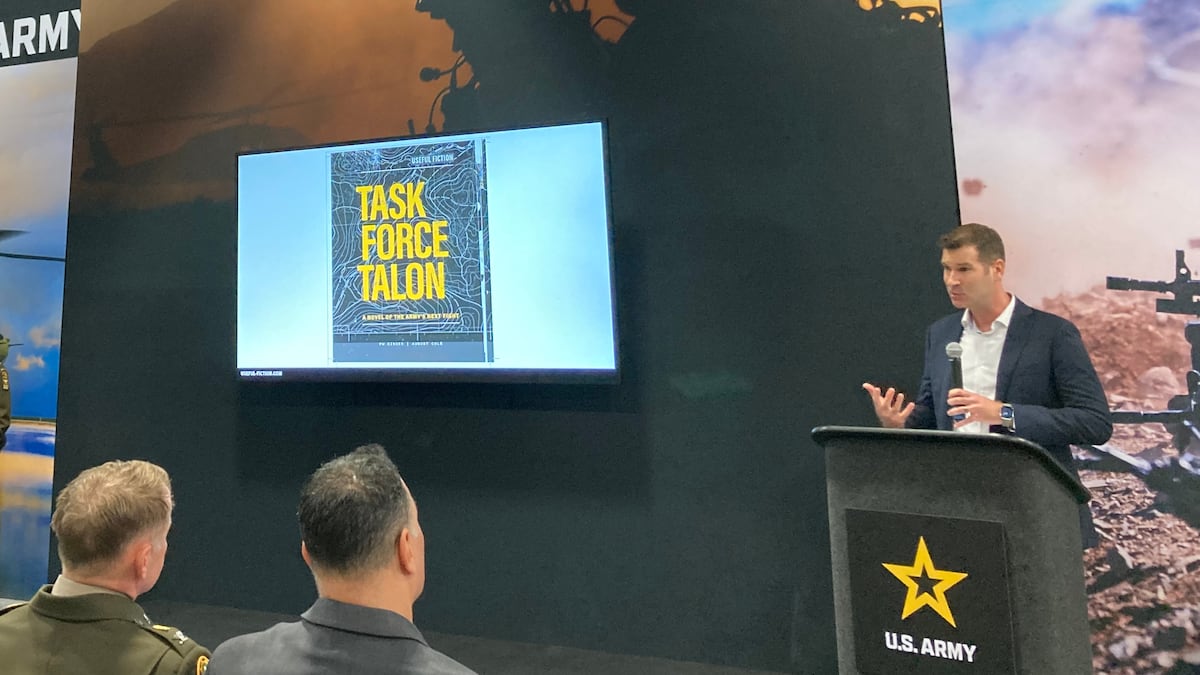The Army’s concept of future warfare is getting the Tom Clancy treatment.
At the Association of the United States Army’s annual conference held in Washington in October, a session on the service’s plans to improve professional writing contained a teaser for a first-of-its-kind project: a novel envisioning a future conflict in a technology-infused battlefield.
“Task Force Talon: A Novel of the Army’s Next Fight,” written by “Ghost Fleet” authors August Cole and P.W. Singer, will “share the real-world lessons from Field Manual 3.0, as well as lessons learned from both contemporary conflicts and recent Army exercises and training,” according to an excerpt provided exclusively to session attendees.
The FM 3-0, most recently updated in October 2022, covers Army operations. As then-Army Chief of Staff Gen. James McConville wrote in the manual’s forward, it’s intended to demonstrate “the first principles of speed, range, and convergence of the cutting-edge technologies needed to achieve future decision dominance and overmatch against our adversaries.”
Task Force Talon is the name of the Army unit that provides ballistic missile defense for the island U.S. territory of Guam.
The protagonist of the novel is Maj. Derek Washington, who finds himself in the middle of a large-scale combat operation shortly after deploying to an unnamed allied country to join his new unit.
“As [Washington’s] unit faces overwhelming odds and new threats ranging from cyber attacks to drone strikes, he must learn both how to lead under fire and how to win the kind of war that the U.S. has not fought for generations,” the distributed synopsis states.
Warfighting tech described in the excerpt includes tactical augmented reality glasses; persistent hostile drone surveillance; micro-targeted disinformation targeting military families, including AI-generated video and audio; and next-gen dashboard screens fusing satellite data and ground networks.
Cole and Singer have pioneered the deliberate use of fiction to gain insights about the future of warfare and the integration of emerging technologies.
The civilian duo’s novel “Ghost Fleet,” published in 2015 and describing a successful attack by China against the U.S. that begins with a Pentagon-infiltrating computer virus, was embraced by numerous generals and flag officers. In the Marine Corps, for example, it spurred workshops and discussions that encouraged troops to brainstorm about the tools and information they’d need on the battlefield of the future.
Singer and Cole ultimately launched Useful Fiction, a partnership through which they hold writing workshops for U.S. and allied military entities including U.S. Special Operations Command and the Air Force’s Air University, among others.
At the Oct. 16 AUSA panel session, Singer described a “double challenge” that forward-looking organizations face, first to understand and frame new technologies and opportunities, and then to communicate the need to evolve and adapt to their members.
“How do you gain and retain attention when so much else is competing for it, whether it’s all the other publications out there, to what’s in their email inbox, to just the scarce resources of time?” Singer said.
He described storytelling as “literally the oldest communication technology of all,” capable of engaging the emotions and imagination in a way PowerPoint cannot. Story can also reframe the concept of change to organization members, he said.
“Change management programs are more likely to succeed when you’re able to tell the story of why we need to change, tell the story of what success will look like, what we’re headed towards,” Singer said. “Most importantly, you’re able to tell your organization you are characters. You are heroes in this story of change, rather than victims of it.”
While the Army has not announced a release date for “Task Force Talon,” Singer said more information about the project’s publication and the Army’s plans for it would be made public “in coming months.”
The information about the new novel was revealed as part of a presentation from The Harding Project, an Army initiative launched in 2023 and led by Lt. Col. Zachary Griffiths, to improve the service’s professional journals and encourage more soldiers to write and publish for the benefit of their fellow troops.
Disclaimer: Hope Hodge Seck has worked as a consultant for Useful Fiction.
Read the full article here


